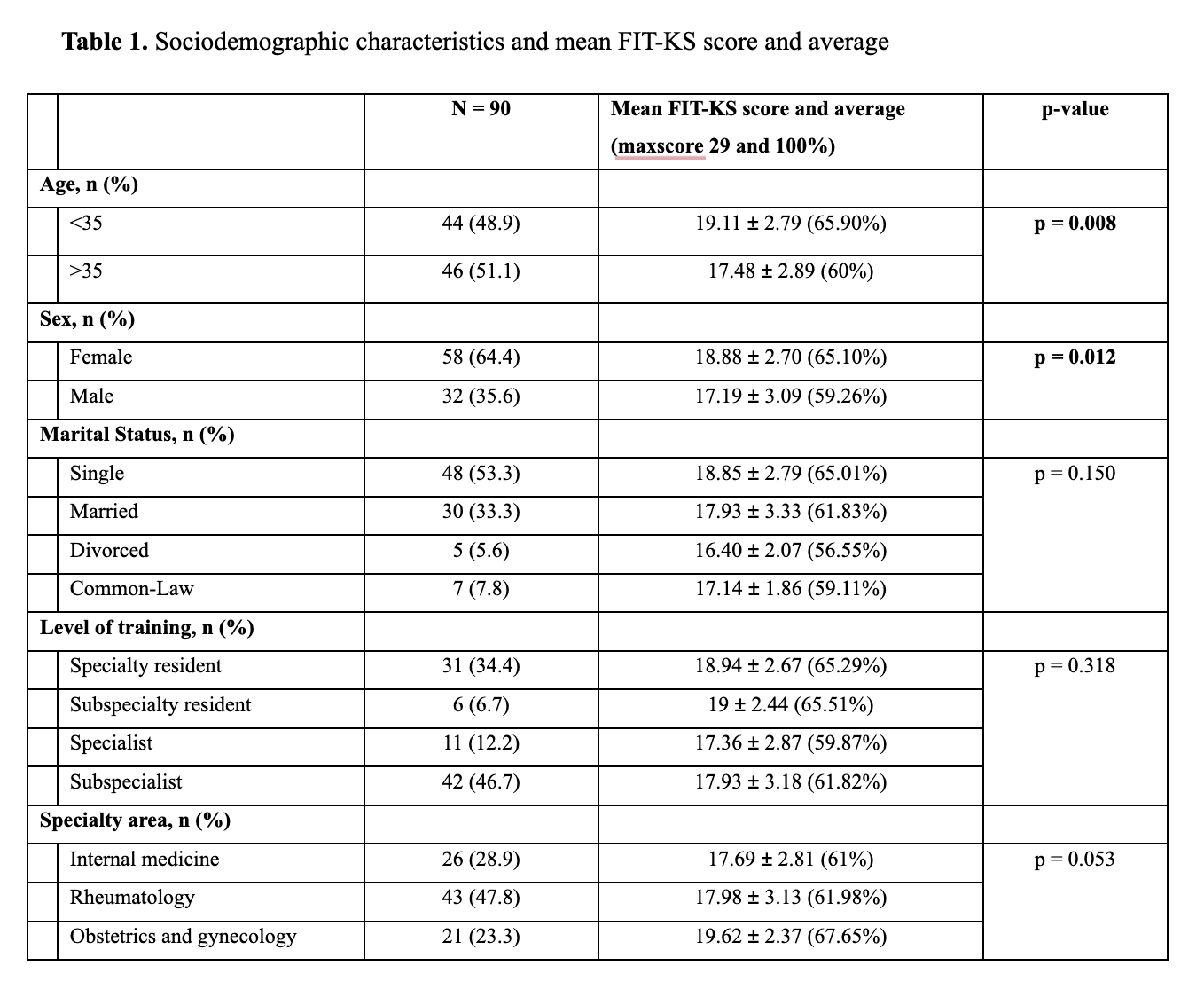Session Information
Session Type: Poster Session C
Session Time: 10:30AM-12:30PM
Background/Purpose: Rheumatic diseases frequently affect individuals of reproductive age, and up to 40–70% may experience fertility issues related to disease activity, medications, delayed childbearing, and sexual dysfunction. Fertility knowledge among physicians is often limited, emphasizing the need for education in reproductive health when managing autoimmune conditions. This study aimed to assess fertility and infertility treatment knowledge among physicians treating women with rheumatic diseases in Mexico using the validated Fertility and Infertility Treatment Knowledge Score (FIT-KS).
Methods: A cross-sectional survey was conducted among residents and specialists in Internal Medicine, Rheumatology, Dermatology, Nephrology, Gynecology, Obstetrics, Maternal-Fetal Medicine, and Reproductive Biology. After accepting the informed consent, the physicians completed an online survey including sociodemographic items and the 29-item FIT-KS, which evaluates knowledge of natural fertility (21 items) and infertility treatments (8 items). Scores ranged from 0 to 29, with higher scores reflecting greater knowledge. Descriptive statistics, t-tests, and ANOVA were used for analysis. A p-value < 0.05 was considered significant.
Results: Ninety physicians participated (mean age 39.8 ± 13.3 years; 64.4% female). The most common specialties were rheumatology (47.8%), internal medicine (24.4%), and obstetrics/gynecology (18.9%). Most correctly identified the fertile age range (91.1%), optimal timing for intercourse (94.4%), egg release per cycle (87.7%), and infertility risks related to smoking (95.6%), obesity (98.9%), and STIs (96.7%). However, fewer were aware of the sharp fertility decline at 35–39 years (52.2%) or monthly conception chances at age 30 or 40 (35.6%). Misunderstandings included miscarriage rates (28.9% correct) and effects of moderate alcohol (33.3%) and caffeine intake (77.8%). While knowledge of in vitro fertilization (IVF) (92.2%) and intrauterine insemination (IUI) (93.3%) was generally accurate, fewer participants knew IVF success rates by age, cost (21.1%), or live birth rates from frozen eggs (15.6%). The study revealed a trend toward higher knowledge in OBGYNs compared to rheumatologists (p = .064) and internists (p = .917), though differences were not statistically significant.
Conclusion: Physicians treating women with rheumatic diseases demonstrated notable gaps in fertility knowledge critical to patient counseling, especially among non-OBGYN specialties. These findings support the need for targeted reproductive health education in rheumatology and internal medicine training programs to enhance fertility-related care in this vulnerable population.
To cite this abstract in AMA style:
Ortiz-Rios A, Ponce-Santillan M, Avalos-Garcia B, Galindo-Calvillo E, Treviño-Sanchez C, Salinas-Rodriguez S, Núñez-Elizondo A, Noyola-Sauceda E, Vazquez-Guerra G, Cardenas-de la Garza J, Perez-Barbosa L, Galarza-Delgado D, Skinner-Taylor C. Knowledge of Fertility and Infertility Treatments Among Physicians Treating Women with Rheumatic Diseases: FIT-KS Survey [abstract]. Arthritis Rheumatol. 2025; 77 (suppl 9). https://acrabstracts.org/abstract/knowledge-of-fertility-and-infertility-treatments-among-physicians-treating-women-with-rheumatic-diseases-fit-ks-survey/. Accessed .« Back to ACR Convergence 2025
ACR Meeting Abstracts - https://acrabstracts.org/abstract/knowledge-of-fertility-and-infertility-treatments-among-physicians-treating-women-with-rheumatic-diseases-fit-ks-survey/


.jpg)
.jpg)